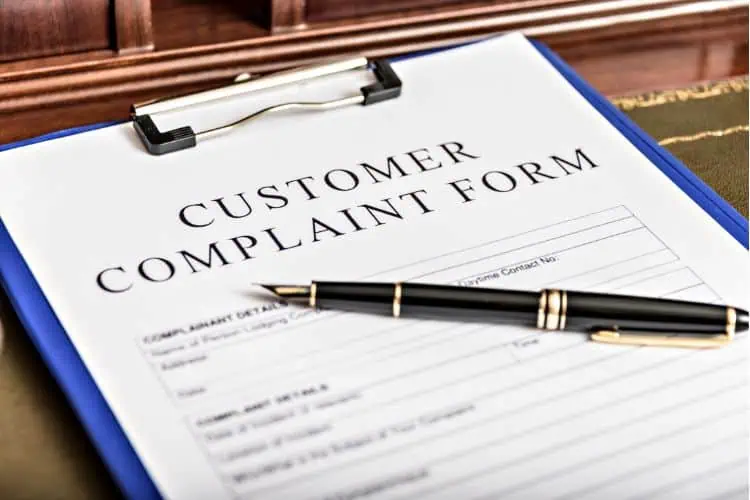Renting a property should be a straightforward process, but disputes can arise when there is poor communication or the terms of the tenancy agreement are not met by either party. Thus, it’s important for both tenants and landlords to know how to complain about a property management company.
Left unresolved, conflicts can escalate into stressful legal battles. So, we’re here to outline the correct procedures to lodge a formal complaint and resolve disputes through the appropriate channels.
Communicating the Issue
The very first step when any rental problem arises is to communicate directly with the property manager or owner. While it may seem obvious, many disputes stem from a simple lack of clear, open communication from the outset.
Raise the issue promptly, discuss it in a respectful manner, refer to the specific terms of the tenancy agreement that are not being upheld, and allow a reasonable timeframe for the breach to be remedied.
Putting complaints in writing via email can be helpful for recording conversations and establishing a paper trail, but voice conversations should not be recorded without the other party’s consent per Queensland laws.

If communicating verbally or over email does not resolve the matter within a suitable time frame, you have the option to issue the property manager/owner with an official Notice to Remedy Breach form. For general tenancies, this is Form 11, or for rooming accommodation, Form R11. These notices put the landlord on record for the violation.
On the notice, be very clear and specific about what the breach entails. Simply citing a “breach of agreement” is too vague. List out exactly what term has been violated, such as lack of repairs, excessive entry into the property, or any other failure to comply with the tenancy agreement. Provide evidence like photographs or documentation that validates your claim.
Give at least the minimum 7 days for the breach to be remedied as required by Queensland law. Setting an appropriate timeline is important – 7 days is likely too little for making major repairs for example. Be reasonable, but firm.
Be sure to fill out the complaint form accurately and keep a copy for your records and any other documentation like emails, photos of unresolved issues, notes from phone calls, etc.
Seeking Assistance
If the property manager or owner does not remedy the breach by the notice date, or if their actions are unacceptable or illegal, it’s time to seek outside assistance.
Thankfully, there are free government resources available to help tenants resolve tenancy disputes:
Residential Tenancies Authority (RTA)
Call 1300 366 311 to access the RTA’s free Dispute Resolution Service. This allows all parties involved – tenants, property managers/owners, etc. – to negotiate with the assistance of a conciliator serving as an impartial third party.
The conciliators can help explain the rights and responsibilities under tenancy laws and facilitate communication between parties.
While not legally binding, resolving the dispute through this formal negotiation process avoids having to go through tribunals or courts. Agreements are formed by consent during conciliation.
However, if no resolution is reached, tenants can still proceed to a tribunal hearing for legal action.
Queensland Statewide Tenant Advice and Referral Service (QSTARS)
Tenants can call 1300 744 263 to receive free advice about their rights and responsibilities under rental agreements in Queensland.
This service does not negotiate disputes directly but can clarify legal matters and provide guidance on residential tenancy issues to ensure you are following all proper procedures if issues persist with the property manager or owner.
Both of these advisory services provide valuable information to tenants and can help determine whether breach notices and further action are being carried out correctly.
Applying to the Tribunal

In cases where the dispute cannot be resolved through initial communication, notices, or negotiation with the RTA’s assistance, you have the option to apply to the Queensland Civil and Administrative Tribunal (QCAT). This independent decision-making body has the authority to make formal orders instructing landlords to rectify breaches.
At QCAT, you can seek specific Performance Orders requiring action from the property manager/owner, such as making outstanding repairs or allowing access to the property.
If you have suffered financial losses or been forced to pay for issues that are the landlord’s responsibility, you may also request compensation orders for those expenses incurred due to the breach of agreement.
The process involves submitting an application to QCAT along with all relevant documentation like your tenancy agreement, breach notices, evidence of the offence like photos or videos, correspondence records, and any other paperwork related to the dispute.
QCAT hearings represent official legal proceedings, so being thoroughly prepared with your evidence and documentation is absolutely critical.
If orders are made by the tribunal and the landlord fails to comply, they may face penalty fines. In those cases, QCAT has enforcement powers to ensure its decisions are upheld.
Common Breaches
Some of the most frequent breaches of tenancy agreements by property managers and owners in Queensland include:
- Failure to properly maintain the property and make necessary repairs in a timely manner.
- Not giving the proper minimum 7 days’ notice before entries for inspections, showings, or other non-emergency purposes.
- Making unlawful entries into the rental unit without any notice or valid reason.
- Making inappropriate or excessive entries that violate the tenant’s right to privacy and peace.
- Failure to properly lodge the tenant’s rental bond money with the RTA.
Additionally, tenants need to be watchful for continuous or repeated breaches of the same type of violation. In cases where the issue is an ongoing problem despite attempts to remedy it, you may be able to exercise your rights to terminate the tenancy agreement before it expires if the landlord shows a pattern of non-compliance.
Ending the Tenancy
If the property manager or owner shows absolutely no intent to remedy substantiated breaches despite official notices, tribunal orders, and all other attempts to resolve the situation through proper channels, your final recourse may be to end the tenancy by issuing a Notice of Intention to Leave (Form 13).
This official notice, which cites the breach as the reason for termination, allows you to vacate the premises by a certain date – even during an active fixed-term tenancy agreement.
However, be aware there could be financial penalties like having to pay compensation for re-letting costs and rent if you choose to break the lease early without sufficient grounds.
It’s also important to note that if the breach is resolved after issuing the Notice of Intention to Leave but before the vacate date, you have the option to withdraw the notice and continue the tenancy if desired. This must be done by providing written notice to the landlord that you no longer intend to vacate.
Terminating the agreement should absolutely be an absolute last resort after every other channel for communication, negotiation, and formal orders has been exhausted but the landlord remains non-compliant. Ending tenancies can have financial consequences, so it’s crucial to follow all protocols before taking that final step.
Wrapping Up
Dealing with an unresponsive or negligent property manager can certainly be frustrating, but it’s critical for tenants to follow the proper procedures and protect themselves legally. Take advantage of free resources like the RTA and QSTARS advice hotlines at the first sign of a rental dispute.
If the issue cannot be resolved through initial communication and breach notices, do not hesitate to escalate by applying for dispute resolution through official channels like QCAT. Ultimately, tenants have rights that allow them to terminate agreements if substantiated breaches go unresolved.
Open communication, thorough documentation, and following the correct legal processes are key to filing and successfully resolving a complaint against a property management company in Queensland. While landlords have obligations, tenants are also responsible for understanding rental laws to ensure their rights are protected.
Also Read: How Much Are Management Fees for Rental Properties

